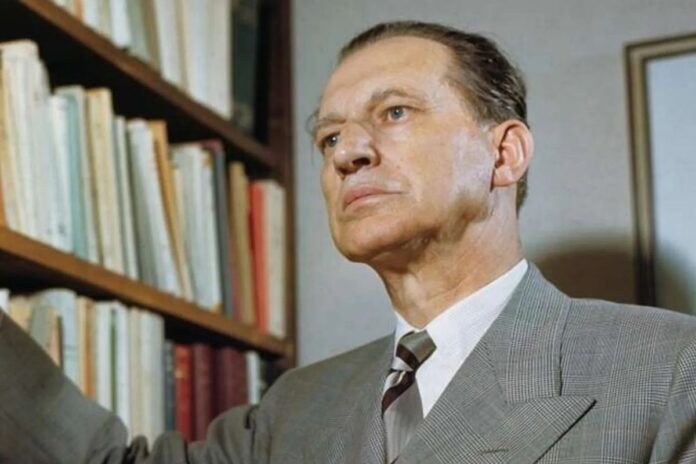Alcide Amedeo Francesco De Gasperi (3 April 1881 – 19 August 1954) was an influential Italian politician and statesman who played a key role in shaping post-war Italy. He founded the Christian Democracy party and served as Italy’s prime minister in eight successive coalition governments from 1945 to 1953.
Introduction
Alcide De Gasperi is a name that resonates deeply in both Italian and European history. As a key architect of post-World War II Italy, his leadership guided the country through its recovery and transformation. De Gasperi also played an instrumental role in laying the groundwork for what would later become the European Union. In this article, we’ll explore De Gasperi’s life, his political career, and his lasting impact on Italy and Europe. Whether you’re a history enthusiast or simply curious about his influence, this article offers a comprehensive look at his achievements.
De Gasperi was the last prime minister of the Kingdom of Italy, serving under both King Victor Emmanuel III and King Umberto II. After Italy voted to abolish the monarchy and establish a republic, he became the first prime minister of the Italian Republic. He also briefly served as the provisional head of state during the transitional period. His long tenure in office, spanning eight years, remains one of the longest in modern Italian political history, making him the fifth longest-serving prime minister since the unification of Italy.
Additionally, A devout Catholic, De Gasperi is regarded as one of the founding fathers of the European Union, alongside fellow Italian Altiero Spinelli, and was instrumental in the early stages of European integration. His leadership and vision significantly influenced Italy’s post-war reconstruction and its role in European politics.
The Early Years of Alcide De Gasperi
A Humble Beginning
Moreover, Alcide De Gasperi was born on April 3, 1881, in Pieve Tesino, a small town in the Trentino region of northern Italy. Growing up in the Austrian Empire, which controlled the region at the time, De Gasperi witnessed firsthand the complexities of border politics. Furthermore, He was a talented student with a keen interest in philosophy, history, and politics, which led him to pursue a career in teaching and journalism.
Political Awakening
De Gasperi’s political journey began in his early adulthood. He was an ardent supporter of Italian unification and took part in the movement that sought to free the northern regions from Austrian control. His deep commitment to the Italian cause and his intellectual leanings drew him into the political sphere, where he soon became involved with the Italian People’s Party (Partito Popolare Italiano). He believed in Christian democracy and social reform, ideals that would shape much of his later work.
De Gasperi’s Role in Post-War Italy
A New Beginning After WWII
After World War II, Italy found itself in ruins—both physically and politically. The country had suffered tremendous losses, and the fascist regime of Mussolini had left a deep scar on its political landscape. In this chaotic time, Alcide De Gasperi emerged as a steady and visionary leader. In 1945, he became the Prime Minister of Italy, a position he held for over a decade.
Rebuilding Italy
De Gasperi’s leadership was marked by a commitment to rebuilding Italy’s economy, political institutions, and international standing. His government focused on several key areas:
- Economic Reconstruction: De Gasperi played a central role in Italy’s economic recovery, securing U.S. aid through the Marshall Plan. This financial support helped stabilize the Italian economy and laid the foundation for the “economic miracle” of the 1950s and 1960s.
- Political Stability: Italy, freshly liberated from fascism, faced a delicate process of rebuilding its political institutions. De Gasperi’s centrist, Christian democratic approach helped unite disparate political factions and create a stable government that could guide Italy through the post-war era.
- Social Reforms: De Gasperi also championed social reforms, including the expansion of social services and education, which helped improve the lives of everyday Italians and fostered a sense of national unity.
The European Vision of Alcide De Gasperi
A European Leader
Alcide De Gasperi’s influence extended far beyond Italy. As an advocate for European integration, he was one of the founding figures of the European Coal and Steel Community (ECSC), which later evolved into the European Union. De Gasperi recognized that the future of Europe lay in cooperation, not division, and he tirelessly worked toward fostering closer ties between European nations.
- The Italian Contribution to European Unity: De Gasperi was a key player in the early discussions that led to the creation of the ECSC in 1951, a forerunner to the EU. His diplomatic efforts helped secure Italy’s place at the heart of the new European order.
- A Champion of Peace: De Gasperi understood that a united Europe was not only a guarantee of economic prosperity but also a means to prevent future conflicts on the continent. His belief in European unity was rooted in his experiences during and after WWII, and his efforts laid the groundwork for the peaceful Europe we know today.
Alcide De Gasperi’s Legacy
Political and Social Reforms
Alcide De Gasperi’s lasting legacy is found in both his political achievements and his social contributions. He is widely regarded as one of the most important figures in 20th-century Italy. His Christian democratic policies were instrumental in shaping Italy’s post-war political system and ensuring its stability. The reforms he introduced set the stage for Italy’s economic growth and social development in the decades that followed.
A Visionary Leader
De Gasperi’s foresight in the realm of European integration was ahead of its time. His role in establishing the ECSC and promoting European unity paved the way for the creation of the European Economic Community (EEC) and, ultimately, the European Union. His vision of a united Europe continues to be a guiding principle for the continent.
FAQ
Who was Alcide De Gasperi?
Alcide De Gasperi was an Italian statesman and one of the founding fathers of the European Union. He served as Italy’s Prime Minister from 1945 to 1953 and was instrumental in Italy’s post-WWII reconstruction and the development of European unity.
What was De Gasperi’s role in the European Union?
De Gasperi was a key figure in the early stages of European integration, advocating for cooperation between European nations. He played a significant role in the creation of the European Coal and Steel Community, the precursor to the European Union.
What were De Gasperi’s key contributions to Italy?
De Gasperi’s key contributions included leading Italy’s post-war economic recovery, fostering political stability, and implementing social reforms. His Christian democratic approach shaped Italy’s political landscape for decades.
Wrapping Up
Alcide De Gasperi’s legacy is one of resilience, leadership, and vision. His work in rebuilding Italy after the devastation of WWII, coupled with his commitment to European unity, has made him a towering figure in both Italian and European history. Today, his contributions continue to resonate, reminding us of the importance of cooperation, both at home and across borders. If you’re interested in learning more about influential figures in European history, De Gasperi’s story is one that cannot be overlooked.




